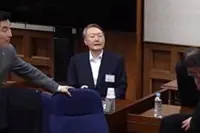SEOUL (Bloomberg): South Korea announced new sanctions on North Korea that target materials for its satellite programme, turning up pressure on its neighbour following a barrage of ballistic missile launches in defiance of global measures banning the tests.
Seoul on Tuesday (March 21) unveiled a "watch-list” of 77 items related to North Korea’s satellite development programme, including optical components, solar panels, antennas and GPS devices. These items will be banned from export to North Korea, as part of the country’s export control measures.





